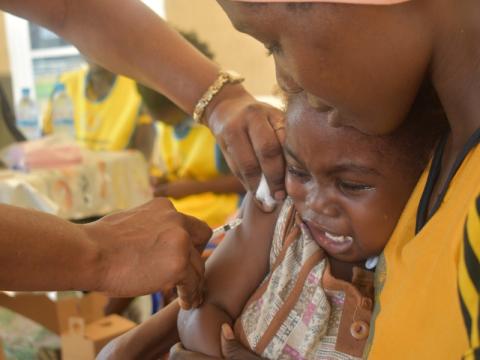“Let us say ENOUGH to Polio in South Sudan!”

“Let us continue to be a beacon of hope and strength to the communities as we ensure that no child misses their vaccination schedule. Let us say ENOUGH to Polio in South Sudan.”
This was the USAID-funded CORE Group Partners Project (CGPP) acting secretariat director Doris Lamunu’s message during the World Polio Day commemoration activity in Juba last Tuesday, 24 October, which is a special day for CGPP South Sudan, its donors, implementing partners, and communities and families it serves.
CGPP commemorated World Polio Day in various locations here in Juba and Kajo-Keji in Central Equatoria, Magwi County in Eastern Equatoria, and Ezo County in Western Equatoria states to increase awareness about the debilitating disease, advocate for immunization, and celebrate the efforts of all those supporting polio eradication activities.

The selection of counties for the World Polio Day celebration was not out of convenience. Instead, the counties – Kajo-Keji, Magwi, and Ezo were among the counties in South Sudan that were identified to have low immunization coverage and high dropout rate in 2022, limited availability of transit routes to neighboring countries, porous borders, and documented evidence of hard-to-reach populations. These attributes were due to conflict, rugged geographical terrains, nomadic settlements, and the high presence of refugees and internally displaced persons. The one-day public event was followed by five days of vaccination within the communities. A total of 818 individuals were vaccinated with different antigens, of which 47 were in Kajo-Keji, 242 in Ezo, and 529 in Magwi. Eighty-two women of childbearing age also received Tetanus-Diphtheria vaccines.
During the event, Doris Lamunu, CGPP Acting Secretariat Director, congratulated and thanked the community-based surveillance network of home health promoters, community key informants, and vaccinators for their unyielding efforts to keep South Sudan polio-free.
She also called upon all community members, especially the mothers “who are the best nurses to the under-five children,” to remain vigilant and report any incidents of abnormal and sudden paralysis to the immediate home health promoter or health facility and to ensure that their children complete their immunization schedule. Doris also graced Miraya FM to speak about the importance of vaccinations.

The celebration in Juba was held at the Al-Shaba Children’s Hospital and was participated in by the Ministry of Health, World Health Organization, United Children’s Fund, and USAID. There was a band procession by schoolchildren from Usratuna and St. Joseph Primary schools, a performance from the Acholi traditional dancers, and a recitation of poems and songs about polio eradication and the importance of routine immunization to their children.
The guest of honor for this occasion, Dr. Atem Nathan Riak, the Director General of Primary Health Care Services of the National Ministry of Health, encouraged the audience to go out and share the messages they heard with their families and communities. “My sister succumbed to polio. Ever since that time, to me, polio eradication has been a personal fight. To the school children here please share the same messages they said and sang to us today with your families,” he said.
Story and photos by Jemima Tumalu, World Vision South Sudan and Core Group Partners Project-South Sudan communications officer